-
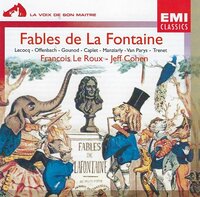 Fables de La Fontaine
Fables de La Fontaine 1991 Fables de La Fontaine. CD. Fables as songs by Lecocq, Offenbach, Gounod, Caplet, de Manziarly, Van Parys, and Trenet. EMI Classics. $17.95 from Gennady Smolyakov, Albuquerque, NM, through Amazon Marketplace, August, '15.
This CD was a revelation to me, through its 22 tracks, of the rich heritage of presentation of La Fontaine's fables as songs. I enjoyed them! Collaborators here are piano and four voices. Lecocq's WL is an excellent example of contrasting wolf and lamb voices. He also has a wonderfully dramatic finish to FC. I found Offenbach's "Shepherd and Sea" eminently understandable. The same goes for his GA. Gounod has several voices, not necessarily in unison, working at once. Caplet and de Manziarly are more "modern," that is, less predictable and "pretty." I enjoyed particularly Caplet's WL with its great closing line and de Manziarly's OF. I found Van Parys more easily comprehensible in his FC, including the inserted "coi, coi, coi." Trenet's GA, among the shortest offerings, seemed to me more playful than others. An auditory treat!
-
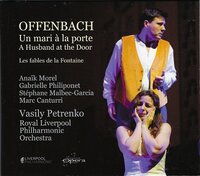 Offenbach: Un mari à la porte; Les fables de la Fontaine
Offenbach: Un mari à la porte; Les fables de la Fontaine 2012 Offenbach: Un mari à la porte; Les fables de la Fontaine. Musical CD. Anaïk Morel. Gabrielle Philiponet, Stephane Malbec-Garcia, and Marc Canturri. Royal Liverpool Philharmonic Orchestra. Unknown source.
This offering of six fables of La Fontaine has as its chief feature that it uses different singers for each fable. The fable accompaniment seems limited to piano. There seems to be some difficulties with the transcription of the French and its translation into English. I enjoyed FC, GA, and MM.
-
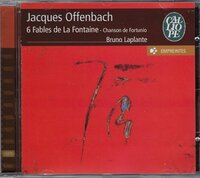 Jacques Offenbach: 6 Fables de La Fontaine; Chanson de Fortunio
Jacques Offenbach: 6 Fables de La Fontaine; Chanson de Fortunio 2004 Jacques Offenbach: 6 Fables de La Fontaine; Chanson de Fortunio. Musical CD. Bruno Laplante, baritone. Marc Durand, pianist. Made in France. Calliope 4881. First recorded by Arpège in 1979. $10 from FOT Records, Van Nuys, CA, through Ebay, Jan., '10.
This is the first time, I believe, that I have sat and listened to these renderings. They are delightful. The music moves wonderfully in coordination with the text of La Fontaine. The silent moment, for example, in "Shepherd and Sea" comes at the time when the former flock owner has lost everything at sea and must return now to be a hired shepherd. The contrast in voices in "Cobbler and Financier" is also engaging. Likewise, the choice of phrases to be repeated supports well what is going on in the text. Besides the title pieces, there are five other offerings on this 50-minute disc. Winner of the award "Grand Prix du Disque."
-
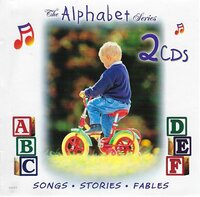 The Alphabet Series 2003
The Alphabet Series 2003 2003 ABC Songs, Stories, Fables. The Alphabet Series CD. Platinum Disc Corporation. $.72 from Mary Anderson, Peyton CO, through Ebay, Jan., '06
This disc has two fables, besides its songs and stories, with a steady background of classical music. GA runs 3:11, features a narrator with a non-native English accent, a woman's voice for the ant, and the moral "We should always make plans for the future." TMCM runs 3:21. The two mice are so eager to be off to the city that they do not even finish the country meal. The country mouse runs--from the cook--head-first into the floorboard before she gets into the hole through it. Then the butler scares off the country mouse for good. Moral: "Better to live a simple and peaceful lifestyle rather than one of luxury and peril. Well, kids, sometimes having the best in life has its price." Confused by that moral, kids?
2003 DEF Songs, Stories, Fables. The Alphabet Series CD. Platinum Disc Corporation. $.72 from Mary Anderson, Peyton CO, through Ebay, Jan., '06
This disc has two fables, besides its songs and stories, with a steady background of classical music. They are Tracks 23 and 24. Both feature a narrator with a non-native English accent. "The Farmer And His Sons" (and the bundle of sticks) runs 1:47 and climaxes in the lesson "Working together to get something usually works out best." FG runs 2:27 and emphasizes almost everything in the story. Thus this is a sly old fox, he is very hungry, and he jumps many times. "Sometimes when we cannot get what we want, we pretend that we didn't really want it at all."
2003 GHI Songs, Stories, Fables. The Alphabet Series CD. Platinum Disc Corporation. $.72 from Mary Anderson, Peyton CO, through Ebay, Jan., '06
This disc has two fables, besides its songs and stories, with a steady background of classical music. They are Tracks 21 and 22. The first features a male narrator with a non-native English accent. "The Goat And The Fox" runs 2:04 and starts in medias res. When the goat appears, the fox seizes his opportunity. The fox lets the goat first drink and then ask the question about getting out. The fox laughs as he goes on his way. "You should always look carefully before you do something." TH runs 5:03, uses a female narrator, and has mother tortoise announce the moral as a general lesson to her children early in the story. "There's no place I really want to go, so I have no need to go hurrying," Tortoise says to Hare's taunting. Hare goes to sleep a second time upon seeing that tortoise has not made much progress during his nap. "Slow and steady will get you to your goals."
2003 JKL Songs, Stories, Fables. The Alphabet Series CD. Platinum Disc Corporation. $.72 from Mary Anderson, Peyton CO, through Ebay, Jan., '06
This disc has three fables, besides its songs and stories, with a steady background of classical music. They are Tracks 23, 24, and 25. The first two feature a male narrator with a non-native English accent. "Jupiter And The Monkey" (and the baby contest) runs 2:02. Jupiter starts to giggle when he sees the monkey baby. "I don't care what Jupiter or anyone else thinks. To me you are the most beautiful baby in the world" "Beauty is in the eye of the beholder." "The King Of The Forest" runs 1:26. The lion is ready to go to war and responds to criticism of them that the donkey and the rabbit have their own gifts. "Everyone is special in his or her own way. You just have to discover what you do best." LM runs 3:31 and uses a female narrator with a second voice for the little mouse. The hunters are so happy with capturing a lion that they go off to a long lunch to celebrate. "Sometimes the weak are able to help the strong. Have you ever helped a grownup do something they had trouble doing themselves?"
2003 MNO Songs, Stories, Fables. The Alphabet Series CD. Platinum Disc Corporation. $.72 from Mary Anderson, Peyton CO, through Ebay, Jan., '06
This disc has two fables, besides its songs and stories, with a steady background of classical music. They are Tracks 22 and 23. The first features a male narrator with a non-native English accent. MSA (2:37) has the male narrator imitating various voices along the way. In this version the bridge breaks and the two humans get wet, though the donkey seems to have got away before the bridge broke. I find that version difficult. "You cannot please everyone all the time. Do you best every day and you will please at least one person a day." "Moving Day For The Larks" (2:02) features a female narrator doing chick voices besides her own. The lark family has mother, father, and three little ones. One moment after they move, the farmer comes through with a scythe. "If you want something to get done, sometimes the only way it will get done is if you do it yourself."
2003 PQR Songs, Stories, Fables. The Alphabet Series CD. Platinum Disc Corporation. $.72 from Mary Anderson, Peyton CO, through Ebay, Jan., '06
This disc has two fables, besides its songs and stories, with a steady background of classical music. They are Tracks 20 and 21. Both are narrated by a male narrator with a non-native English accent. "The Peacock And The Crane" (2:43) elaborates the tale that has the peacock mocking the crane's drab color; the peacock has to concede that the crane can fly and sing and that the peacock's purpose is to look beautiful. "Do not judge someone by the way he or she looks. It is what is inside that really matters. You are all special in your own way and give to life your own little gift." "The Popular Hare" (3:38) had been told by many animals that he is their best friend. A branch fell on the poor hare and injured one of his hind legs. He knew that the villagers would be out hunting with their dogs the next day. The narrator moderates his voice for various "friends" of the hare: horse, bull, goat, donkey, ox, bear. The hare returned exhausted to his family that night aware that, though he was popular, true friends will always be there to help when you need them most.
2003 STUV Songs, Stories, Fables. The Alphabet Series CD. Platinum Disc Corporation. $.72 from Mary Anderson, Peyton CO, through Ebay, Jan., '06
This disc has two fables, besides its songs and stories, with a steady background of classical music. They are Tracks 19 and 20. Both are narrated by a male narrator with a non-native English accent. SW (4:04) has an elaborate argument lasting for weeks and causing both the north wind and the sun to neglect their normal duties. The bet is well expressed; it is about "whichever of us can get the coat off of that farmer." The effects of both north wind and sun are described in cosmic terms. "Often it is easier to get what you want by kindness than by force." "The Vain Jackdaw" (2:36) begins with an old jackdaw draped in peacock feathers. He struts about proudly and is mean to his fellow jackdaws. "Stay away" he says to them "or you will damage my beautiful feathers." He leaves his friends confident that the peacocks will accept him. The peacocks are not fooled. His friends, to whom he then goes for comfort, will have nothing to do with him. "You should never be what you are not. Being yourself is always the best."
2003 WXYZ Songs, Stories, Fables. The Alphabet Series CD. Platinum Disc Corporation. $.72 from Mary Anderson, Peyton CO, through Ebay, Jan., '06
This disc has three fables, besides its songs and stories, with a steady background of classical music. They are Tracks 15, 16, and 17. They are narrated by a male narrator with a non-native English accent. "The White Cat And The Imps" (2:37), not really a fable, involves a traveller who has captured a bear and asks to stay in a solitary woodsman's cabin. The latter quickly agrees but mentions that tonight is the night for the trolls' annual banquet in his cabin. During the riotous festivities, one troll feels the bear in the bed in the dark, and soon all the trolls disappear. When they return the next year, they ask about the man's "cat" and hear his response that her seven kittens have grown up in the meantime. Goodbye, trolls! "You should not take advantage of a good-hearted person." "The Wolf in Disguise" (2:14) fools the sheep and the shepherd but waits till dark to grab the fattest sheep he can find. The shepherd comes out early the next morning saying "We want a nice sheep to come to the farmhouse to play with some city children" and picks out this biggest sheep. The wolf runs out of the sheepskin into the dark night. I think this version has to resolve its times. It is unusual in letting the wolf get away alive. "You should not try to fool people, as it may turn around and hurt you." "Yvette's Dream" (2:48) runs through eggs, a goose, sheep, wool, dress, cheeses, a hat, red dancing shoes, a prince, a royal ball, and marriage. For no apparent reason, the jug falls off her head. "There is no harm in daydreaming, but we should reach the first dream before we begin living in the next one. Don't count your chickens before they have hatched."
-
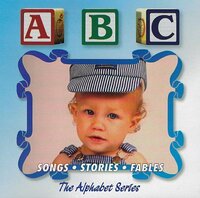 The Alphabet Series 1997
The Alphabet Series 1997 1997 ABC Songs, Stories, Fables. The Alphabet Series CD. Series compiled by Lucy Toppetta. Music by Matthew Campanozzi. Narration and Singing by Emilu Productions. Manufactured in the USA. New Hope, MN: The Alphabet Series: Mint Studios: Navarre: ©1997 Public Music Inc. Gift of Linda Schlafer, Nov., '97.
This disc has two fables, besides its songs and stories, with a steady background of classical music. GA runs 3:11, features a narrator with a non-native English accent, a woman's voice for the ant, and the moral "We should always make plans for the future." TMCM runs 3:21. The two mice are so eager to be off to the city that they do not even finish the country meal. The country mouse runs--from the cook--head-first into the floorboard before she gets into the hole through it. Then the butler scares off the country mouse for good. Moral: "Better to live a simple and peaceful lifestyle rather than one of luxury and peril. Well, kids, sometimes having the best in life has its price." Confused by that moral, kids?
1997 DEF Songs, Stories, Fables. The Alphabet Series CD. Series compiled by Lucy Toppetta. Music by Matthew Campanozzi. Narration and Singing by Emilu Productions. Manufactured in the USA. New Hope, MN: The Alphabet Series: Mint Studios: Navarre: ©1997 Public Music Inc. Gift of Linda Schlafer, Nov., '97.
This disc has two fables, besides its songs and stories, with a steady background of classical music. They are Tracks 23 and 24. Both feature a narrator with a non-native English accent. "The Farmer And His Sons" (and the bundle of sticks) runs 1:47 and climaxes in the lesson "Working together to get something usually works out best." FG runs 2:27 and emphasizes almost everything in the story. Thus this is a sly old fox, he is very hungry, and he jumps many times. "Sometimes when we cannot get what we want, we pretend that we didn't really want it at all."
1997 GHI Songs, Stories, Fables. The Alphabet Series CD. Series compiled by Lucy Toppetta. Music by Matthew Campanozzi. Narration and Singing by Emilu Productions. Manufactured in the USA. New Hope, MN: The Alphabet Series: Mint Studios: Navarre: ©1997 Public Music Inc. Gift of Linda Schlafer, Nov., '97.
This disc has two fables, besides its songs and stories, with a steady background of classical music. They are Tracks 21 and 22. The first features a male narrator with a non-native English accent. "The Goat And The Fox" runs 2:04 and starts in medias res. When the goat appears, the fox seizes his opportunity. The fox lets the goat first drink and then ask the question about getting out. The fox laughs as he goes on his way. "You should always look carefully before you do something." TH runs 5:03, uses a female narrator, and has mother tortoise announce the moral as a general lesson to her children early in the story. "There's no place I really want to go, so I have no need to go hurrying," Tortoise says to Hare's taunting. Hare goes to sleep a second time upon seeing that tortoise has not made much progress during his nap. "Slow and steady will get you to your goals."
1997 JKL Songs, Stories, Fables. The Alphabet Series CD. Series compiled by Lucy Toppetta. Music by Matthew Campanozzi. Narration and Singing by Emilu Productions. Manufactured in the USA. New Hope, MN: The Alphabet Series: Mint Studios: Navarre: ©1997 Public Music Inc. Gift of Linda Schlafer, Nov., '97.
This disc has three fables, besides its songs and stories, with a steady background of classical music. They are Tracks 23, 24, and 25. The first two feature a male narrator with a non-native English accent. "Jupiter And The Monkey" (and the baby contest) runs 2:02. Jupiter starts to giggle when he sees the monkey baby. "I don't care what Jupiter or anyone else thinks. To me you are the most beautiful baby in the world" "Beauty is in the eye of the beholder." "The King Of The Forest" runs 1:26. The lion is ready to go to war and responds to criticism of them that the donkey and the rabbit have their own gifts. "Everyone is special in his or her own way. You just have to discover what you do best." LM runs 3:31 and uses a female narrator with a second voice for the little mouse. The hunters are so happy with capturing a lion that they go off to a long lunch to celebrate. "Sometimes the weak are able to help the strong. Have you ever helped a grownup do something they had trouble doing themselves?"
1997 MNO Songs, Stories, Fables. The Alphabet Series CD. Series compiled by Lucy Toppetta. Music by Matthew Campanozzi. Narration and Singing by Emilu Productions. Manufactured in the USA. New Hope, MN: The Alphabet Series: Mint Studios: Navarre: ©1997 Public Music Inc. Gift of Linda Schlafer, Nov., '97.
This disc has two fables, besides its songs and stories, with a steady background of classical music. They are Tracks 22 and 23. The first features a male narrator with a non-native English accent. MSA (2:37) has the male narrator imitating various voices along the way. In this version the bridge breaks and the two humans get wet, though the donkey seems to have got away before the bridge broke. I find that version difficult. "You cannot please everyone all the time. Do you best every day and you will please at least one person a day." "Moving Day For The Larks" (2:02) features a female narrator doing chick voices besides her own. The lark family has mother, father, and three little ones. One moment after they move, the farmer comes through with a scythe. "If you want something to get done, sometimes the only way it will get done is if you do it yourself."
1997 PQR Songs, Stories, Fables. The Alphabet Series CD. Series compiled by Lucy Toppetta. Music by Matthew Campanozzi. Narration and Singing by Emilu Productions. Manufactured in the USA. New Hope, MN: The Alphabet Series: Mint Studios: Navarre: ©1997 Public Music Inc. Gift of Linda Schlafer, Nov., '97.
This disc has two fables, besides its songs and stories, with a steady background of classical music. They are Tracks 20 and 21. Both are narrated by a male narrator with a non-native English accent. "The Peacock And The Crane" (2:43) elaborates the tale that has the peacock mocking the crane's drab color; the peacock has to concede that the crane can fly and sing and that the peacock's purpose is to look beautiful. "Do not judge someone by the way he or she looks. It is what is inside that really matters. You are all special in your own way and give to life your own little gift." "The Popular Hare" (3:38) had been told by many animals that he is their best friend. A branch fell on the poor hare and injured one of his hind legs. He knew that the villagers would be out hunting with their dogs the next day. The narrator moderates his voice for various "friends" of the hare: horse, bull, goat, donkey, ox, bear. The hare returned exhausted to his family that night aware that, though he was popular, true friends will always be there to help when you need them most.
1997 STUV Songs, Stories, Fables. The Alphabet Series CD. Series compiled by Lucy Toppetta. Music by Matthew Campanozzi. Narration and Singing by Emilu Productions. Manufactured in the USA. New Hope, MN: The Alphabet Series: Mint Studios: Navarre: ©1997 Public Music Inc. Gift of Linda Schlafer, Nov., '97.
This disc has two fables, besides its songs and stories, with a steady background of classical music. They are Tracks 19 and 20. Both are narrated by a male narrator with a non-native English accent. SW (4:04) has an elaborate argument lasting for weeks and causing both the north wind and the sun to neglect their normal duties. The bet is well expressed; it is about "whichever of us can get the coat off of that farmer." The effects of both north wind and sun are described in cosmic terms. "Often it is easier to get what you want by kindness than by force." "The Vain Jackdaw" (2:36) begins with an old jackdaw draped in peacock feathers. He struts about proudly and is mean to his fellow jackdaws. "Stay away" he says to them "or you will damage my beautiful feathers." He leaves his friends confident that the peacocks will accept him. The peacocks are not fooled. His friends, to whom he then goes for comfort, will have nothing to do with him. "You should never be what you are not. Being yourself is always the best."
1997 WXYZ Songs, Stories, Fables. The Alphabet Series CD. Series compiled by Lucy Toppetta. Music by Matthew Campanozzi. Narration and Singing by Emilu Productions. Manufactured in the USA. New Hope, MN: The Alphabet Series: Mint Studios: Navarre: ©1997 Public Music Inc. Gift of Linda Schlafer, Nov., '97.
This disc has three fables, besides its songs and stories, with a steady background of classical music. They are Tracks 15, 16, and 17. They are narrated by a male narrator with a non-native English accent. "The White Cat And The Imps" (2:37), not really a fable, involves a traveller who has captured a bear and asks to stay in a solitary woodsman's cabin. The latter quickly agrees but mentions that tonight is the night for the trolls' annual banquet in his cabin. During the riotous festivities, one troll feels the bear in the bed in the dark, and soon all the trolls disappear. When they return the next year, they ask about the man's "cat" and hear his response that her seven kittens have grown up in the meantime. Goodbye, trolls! "You should not take advantage of a good-hearted person." "The Wolf in Disguise" (2:14) fools the sheep and the shepherd but waits till dark to grab the fattest sheep he can find. The shepherd comes out early the next morning saying "We want a nice sheep to come to the farmhouse to play with some city children" and picks out this biggest sheep. The wolf runs out of the sheepskin into the dark night. I think this version has to resolve its times. It is unusual in letting the wolf get away alive. "You should not try to fool people, as it may turn around and hurt you." "Yvette's Dream" (2:48) runs through eggs, a goose, sheep, wool, dress, cheeses, a hat, red dancing shoes, a prince, a royal ball, and marriage. For no apparent reason, the jug falls off her head. "There is no harm in daydreaming, but we should reach the first dream before we begin living in the next one. Don't count your chickens before they have hatched."
-
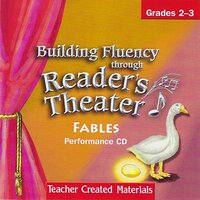 Fables Performance CDs
Fables Performance CDs 2009 Fables Performance CDs. Building Fluency through Reader's Theater. Grades 2-3. 3 CDs. Teacher Created Materials. Unknown source.
These three CDs accompany a set of eight booklets also created by Teacher Created Materials. The first disc covers TH, GGE and BW. At the start of this first disc there is a set of good tips to help through young readers their performance. Each story then has an opening track on characters, setting, and script reading. Each story also includes a song and concludes with a poem. I listened to all of TH and enjoyed its excellent voices, music, and sound effects. There are particularly good secondary characters used to echo main characters' viewpoints. Here lazy hare sleeps through the start of the race and takes another deliberate nap along the way. He forgets to tie his shoelaces, and that causes him to lose.
Disc 2 presents GA, LM, and TMCM.
Disc 3 offers FC, SW, and instrumental versions of the songs.
-
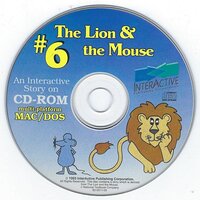 The Lion & the Mouse CD-ROM
The Lion & the Mouse CD-ROM 1993 The Lion & the Mouse CD-ROM. Production Manager George Fleischman. Produced in USA. Interactive Publishing Corporation. $10 at the Omaha Computer Swap Meet, May, '98. One extra copy of the disc for $5 from an Omaha computer fair.
This is a simple presentation of LM on cartoon slides with the text on the screen highlighted phrase by phrase while it is read. A listener can also click on any word to have it said or on any object to see and hear the word. The reading is enhanced with simple musical background and some sound effects. The speed of the presentation is so slow that it is burdensome to any but those who are learning to read. The text is copyrighted by National Textbook Company, the producers of Leonardo el León y Ramon el Ratón/Leonard the Lion and Raymond the Mouse (1978/90). An audio cassette is included with the same sound track (listed separately under 1993) and so are crayons to color the printable black-and-white slides. To get the CD-ROM running, I followed the sequence Start/Run/D:/OK and double-clicked on the "go.bat" icon. Leonard and Marty are the characters here. The story is told in the present tense. The slides composed completely of Leonard's face when he is angry with Marty are excellent. "I don't make a good meal, but I do make a good friend" Marty pleads.
-
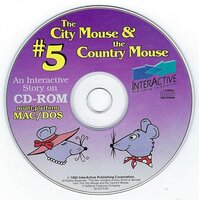 The City Mouse & the Country Mouse Interactive CD-ROM
The City Mouse & the Country Mouse Interactive CD-ROM 1993 The City Mouse & the Country Mouse Interactive CD-ROM. Production Manager George Fleischman. Produced in USA. Interactive Publishing Corporation. $10 at the Omaha Computer Swap Meet, May, '98. One extra copy of the disc for $5 from an Omaha computer fair.
This is a simple presentation of TMCM on cartoon slides with the text on the screen highlighted phrase by phrase while it is read. A listener can also click on any word to have it said or on any object to see and hear the word. The reading is enhanced with simple musical background and some sound effects. The speed of the presentation is so slow that it is burdensome to any but those who are learning to read. The text is copyrighted by National Textbook Company, the producers of Chiquita y Pepita (1978/89). Compare the bus-seat illustration here with the one there. An audio cassette is included with the same sound track (listed separately under 1993) and so are crayons to color the printable black-and-white slides. To get the CD-ROM running, I followed the sequence Start/Run/D:/OK and double-clicked on the "go.bat" icon. Molly (CM) and Margaret (TM) are cousins. Molly invites Margaret to a party along with a number of friends. A large dog attacks in the city even before the mice get to food. Molly drinks some wine with Margaret helping by holding the glass. At dinner a cat attacks. Further, loud noises like the clock's bonging bother Molly.
-
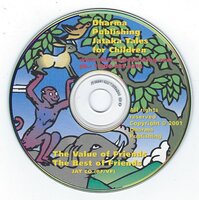 The Value of Friends/The Best of Friends
The Value of Friends/The Best of Friends 2001 The Value of Friends/The Best of Friends. Oakland: Jataka Tales for Children: Dharma Publishing. $3 from the publisher, Dec., '04.
This CD-Rom, produced together with a coloring book containing the texts, presents the stories in two booklets with these same titles, published in 1990 and 1989, respectively. There are several voices, music, and good sound effects. The LC blurb for "The Value of Friends" is accurate: the hawk and his family are made aware of the value of friendship when their friends the osprey, the lion, and the tortoise save them from hungry country folk. In "The Best of Friends," a Great Being, in the form of a woodpecker, frees a lion from a bone caught in his throat. They encounter each other later when the woodpecker is hungry and the lion has just made a kill. The lion dismisses the woodpecker. The latter will not, however, get revenge, as he tells a sky fairy. He explains that "He helped the lion in order to end his pain, not to gain a reward." The woodpecker adds that he counts as friends everyone he meets.
-
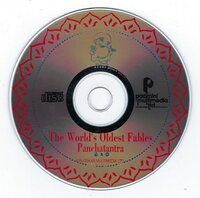 Fables from India: Interactive CD-ROM:Timeless Classics from "The Panchatantra," The World's Most Ancient Collection of Children's Stories
Fables from India: Interactive CD-ROM:Timeless Classics from "The Panchatantra," The World's Most Ancient Collection of Children's Stories 1996 Fables from India: Interactive CD-ROM:Timeless Classics from "The Panchatantra," The World's Most Ancient Collection of Children's Stories. Narrated by Ravishankar. Various visual artists. New Delhi: Padmini Multimedia Limited. From Glass Eye Industries, Toledo, OH.
A delightful CD-ROM featuring five good stories with about five to ten screens each. After a portion of the story is read--in delightful British overseas accent--for that screen, a viewer can play with its characters: frogs catch flies when clicked on, lizards crawl across rocks, skeletons come out of caves and dance. The last frame of each story is a moral little song. There is often a nice finishing phase to a scene when the viewer clicks to go on to the following episode. The beginning presents the usual Panchatantra beginning, since the king is worried about his three lazy sons, and a minister promises to educate them through fables in 180 days. "Friends Become Foes" is the basic Kalila and Dimna story, with Raaja the lion, Sanjeet the bull, and Daama the cunning minister. "The Monkey's Curiosity" is familiar: Mangu gets his leg caught in the cleft left by the carpenter's wedge. "The Lion and the Rabbit" has perhaps the best scene in the video as animals disappear into the lion's cave, we hear only the sound of munching, and bones are thrown out. A pig even prompts a belch! This story uses a river for the lion's reflection in place of the usual well. "The Two Bed Bugs" does not include a louse; Vispa and Dannu both get away after Dannu carelessly bites the king before he is asleep. "The Two Friends" is about Papu and Darmu, whom I first met as Straight and Sneaky. This is one of the easiest CD-ROMs I have worked with, and one of the most enjoyable for its interactivity. Beware: pressing escape exits the whole program.
-
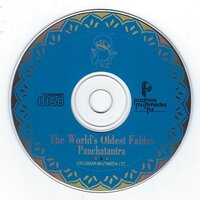 Fables from India: Interactive CD-ROM:Timeless Classics from "The Panchatantra," The World's Most Ancient Collection of Children's Stories
Fables from India: Interactive CD-ROM:Timeless Classics from "The Panchatantra," The World's Most Ancient Collection of Children's Stories 1996 Fables from India: Interactive CD-ROM:Timeless Classics from "The Panchatantra," The World's Most Ancient Collection of Children's Stories. Narrated by Ravishankar. Various visual artists. New Delhi: Padmini Multimedia Limited. From Glass Eye Industries, Toledo, OH.
A delightful CD-ROM featuring five good stories with about five to ten screens each. After a portion of the story is read--in delightful British overseas accent--for that screen, a viewer can play with its characters: frogs catch flies when clicked on, lizards crawl across rocks, skeletons come out of caves and dance. The last frame of each story is a moral little song. There is often a nice finishing phase to a scene when the viewer clicks to go on to the following episode. The beginning presents the usual Panchatantra beginning, since the king is worried about his three lazy sons, and a minister promises to educate them through fables in 180 days. "Friends Become Foes" is the basic Kalila and Dimna story, with Raaja the lion, Sanjeet the bull, and Daama the cunning minister. "The Monkey's Curiosity" is familiar: Mangu gets his leg caught in the cleft left by the carpenter's wedge. "The Lion and the Rabbit" has perhaps the best scene in the video as animals disappear into the lion's cave, we hear only the sound of munching, and bones are thrown out. A pig even prompts a belch! This story uses a river for the lion's reflection in place of the usual well. "The Two Bed Bugs" does not include a louse; Vispa and Dannu both get away after Dannu carelessly bites the king before he is asleep. "The Two Friends" is about Papu and Darmu, whom I first met as Straight and Sneaky. This is one of the easiest CD-ROMs I have worked with, and one of the most enjoyable for its interactivity. Beware: pressing escape exits the whole program.
-
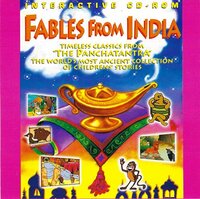 Fables from India: Interactive CD-ROM:Timeless Classics from "The Panchatantra," The World's Most Ancient Collection of Children's Stories
Fables from India: Interactive CD-ROM:Timeless Classics from "The Panchatantra," The World's Most Ancient Collection of Children's Stories 1996 Fables from India: Interactive CD-ROM:Timeless Classics from "The Panchatantra," The World's Most Ancient Collection of Children's Stories. Narrated by Ravishankar. Various visual artists. New Delhi: Padmini Multimedia Limited. $7.50 from Rudolph Goetze, NY, through Ebay, June, '99.
A delightful CD-ROM featuring five good stories with about five to ten screens each. After a portion of the story is read--in delightful British overseas accent--for that screen, a viewer can play with its characters: frogs catch flies when clicked on, lizards crawl across rocks, skeletons come out of caves and dance. The last frame of each story is a moral little song. There is often a nice finishing phase to a scene when the viewer clicks to go on to the following episode. The beginning presents the usual Panchatantra beginning, since the king is worried about his three lazy sons, and a minister promises to educate them through fables in 180 days. "Friends Become Foes" is the basic Kalila and Dimna story, with Raaja the lion, Sanjeet the bull, and Daama the cunning minister. "The Monkey's Curiosity" is familiar: Mangu gets his leg caught in the cleft left by the carpenter's wedge. "The Lion and the Rabbit" has perhaps the best scene in the video as animals disappear into the lion's cave, we hear only the sound of munching, and bones are thrown out. A pig even prompts a belch! This story uses a river for the lion's reflection in place of the usual well. "The Two Bed Bugs" does not include a louse; Vispa and Dannu both get away after Dannu carelessly bites the king before he is asleep. "The Two Friends" is about Papu and Darmu, whom I first met as Straight and Sneaky. This is one of the easiest CD-ROMs I have worked with, and one of the most enjoyable for its interactivity. Beware: pressing escape exits the whole program.
-
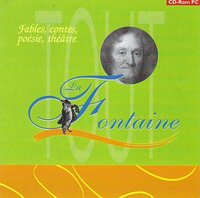 La Fontaine: Texte Intégral: Fables, contes, poésie, théâtre
La Fontaine: Texte Intégral: Fables, contes, poésie, théâtre 1999 La Fontaine: Texte Intégral: Fables, contes, poésie, théâtre. Fabriqué en France. France inter. Bibliopolis. $18.53 from Frederic Dussault, Mont St.-Hilaire, Quebec, Canada, through eBay, Sept., '03.
This is a CD-Rom containing the text of La Fontaine's works. GA begins on 40, and the last fable finishes on 590. Of course, all the other works of La Fontaine are here as well. This is probably my first French CD-Rom. How nice to be able to have the full text on one's computer! Alas, there are no illustrations that I can find on the disc.
-
 Learn 9 Languages with Aesop's Fables
Learn 9 Languages with Aesop's Fables CD-ROM for Windows & Mac. Selectsoft.
-
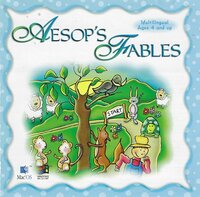 Aesop's Fables
Aesop's Fables Multilingual. Ages 4 and up. Fairy Tales & Fables from Pinenut Publishing, Vol. I. Buffalo, NY: Pinenut Publishing. Made in Canada.
-
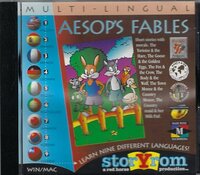 Aesop's Fables Multi-Lingual
Aesop's Fables Multi-Lingual CD-ROM. "Learn nine different languages!" For Windows & Mac. Storyrom: Red Horse Production.
-
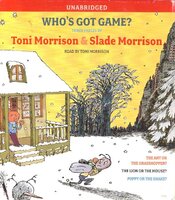 Who's Got Game? Three Fables
Who's Got Game? Three Fables Toni Morrison & Slade Morrison. Read by Toni Morrison. Simon & Schuster. Disc, jewel case, and slipcase.
-
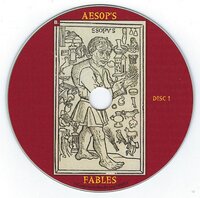 Aesop's Fables
Aesop's Fables et of seven CD-Roms, six offering audio versions of V.S. Vernon Jones' texts of Aesop's Fables and one offering 247 images by Arthur Rackham. CoopAudioBooks.org.
-
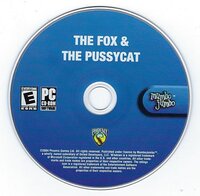 The Fox and the Pussycat
The Fox and the Pussycat CD-ROM. Mumbo-Jumbo. Phoenix Games Ltd.
-
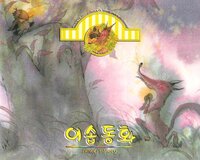 Aesop's Story: Korean Version
Aesop's Story: Korean Version ersions by Mary Drake. Boxed set of seven books and two CD's. Aesop's Story: L.K. Family: L.K. Sellobby Korea.
-
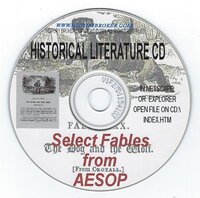 Select Fables from Aesop
Select Fables from Aesop Historical Literature CD. History Broker. CD facsimile of Select Fables from Aesop and Others with Two Hundred Illustrations, published by Leary and Getz in Philadelphia in about 1856.
-
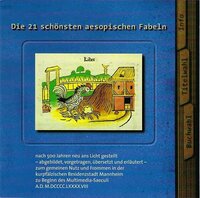 Die 21 schönsten aesopischen Fabeln: CD-ROM
Die 21 schönsten aesopischen Fabeln: CD-ROM Wolfgang Schibel. Illustrations from Ulm, Sebastian Brand, and J.-B. Oudry. CD-ROM. Made in Mannheim. Mannheim: MATEO (Mannheimer Texte Online). Manufactured by Cyperfection GmbH.
-
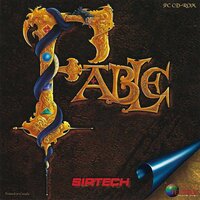 Fable
Fable Video game on CD-ROM. Sir-tech Software. Telstar Electronic Studios. Along with the Manual and Official Hint Guide.
-
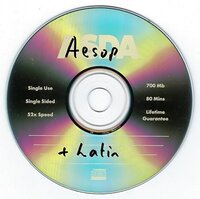 CD-ROM containing a PDF of an 1884 Aesop's texts
CD-ROM containing a PDF of an 1884 Aesop's texts CD-ROM containing a PDF of an 1884 Aesop's texts, consuming 91 pages on the disc. Accompanied by exercises based on the Cambridge Latin Course, unrelated to Aesop's Fables.
-
 The Monkey King
The Monkey King English/Chinese CD-ROM: Interactive, Animated World Fairy Tales With Educational Games. Age 3-14. Topdisc: Power Source Multimedia USA.
 Fables de La Fontaine 1991 Fables de La Fontaine. CD. Fables as songs by Lecocq, Offenbach, Gounod, Caplet, de Manziarly, Van Parys, and Trenet. EMI Classics. $17.95 from Gennady Smolyakov, Albuquerque, NM, through Amazon Marketplace, August, '15. This CD was a revelation to me, through its 22 tracks, of the rich heritage of presentation of La Fontaine's fables as songs. I enjoyed them! Collaborators here are piano and four voices. Lecocq's WL is an excellent example of contrasting wolf and lamb voices. He also has a wonderfully dramatic finish to FC. I found Offenbach's "Shepherd and Sea" eminently understandable. The same goes for his GA. Gounod has several voices, not necessarily in unison, working at once. Caplet and de Manziarly are more "modern," that is, less predictable and "pretty." I enjoyed particularly Caplet's WL with its great closing line and de Manziarly's OF. I found Van Parys more easily comprehensible in his FC, including the inserted "coi, coi, coi." Trenet's GA, among the shortest offerings, seemed to me more playful than others. An auditory treat!
Fables de La Fontaine 1991 Fables de La Fontaine. CD. Fables as songs by Lecocq, Offenbach, Gounod, Caplet, de Manziarly, Van Parys, and Trenet. EMI Classics. $17.95 from Gennady Smolyakov, Albuquerque, NM, through Amazon Marketplace, August, '15. This CD was a revelation to me, through its 22 tracks, of the rich heritage of presentation of La Fontaine's fables as songs. I enjoyed them! Collaborators here are piano and four voices. Lecocq's WL is an excellent example of contrasting wolf and lamb voices. He also has a wonderfully dramatic finish to FC. I found Offenbach's "Shepherd and Sea" eminently understandable. The same goes for his GA. Gounod has several voices, not necessarily in unison, working at once. Caplet and de Manziarly are more "modern," that is, less predictable and "pretty." I enjoyed particularly Caplet's WL with its great closing line and de Manziarly's OF. I found Van Parys more easily comprehensible in his FC, including the inserted "coi, coi, coi." Trenet's GA, among the shortest offerings, seemed to me more playful than others. An auditory treat! Offenbach: Un mari à la porte; Les fables de la Fontaine 2012 Offenbach: Un mari à la porte; Les fables de la Fontaine. Musical CD. Anaïk Morel. Gabrielle Philiponet, Stephane Malbec-Garcia, and Marc Canturri. Royal Liverpool Philharmonic Orchestra. Unknown source. This offering of six fables of La Fontaine has as its chief feature that it uses different singers for each fable. The fable accompaniment seems limited to piano. There seems to be some difficulties with the transcription of the French and its translation into English. I enjoyed FC, GA, and MM.
Offenbach: Un mari à la porte; Les fables de la Fontaine 2012 Offenbach: Un mari à la porte; Les fables de la Fontaine. Musical CD. Anaïk Morel. Gabrielle Philiponet, Stephane Malbec-Garcia, and Marc Canturri. Royal Liverpool Philharmonic Orchestra. Unknown source. This offering of six fables of La Fontaine has as its chief feature that it uses different singers for each fable. The fable accompaniment seems limited to piano. There seems to be some difficulties with the transcription of the French and its translation into English. I enjoyed FC, GA, and MM. Jacques Offenbach: 6 Fables de La Fontaine; Chanson de Fortunio 2004 Jacques Offenbach: 6 Fables de La Fontaine; Chanson de Fortunio. Musical CD. Bruno Laplante, baritone. Marc Durand, pianist. Made in France. Calliope 4881. First recorded by Arpège in 1979. $10 from FOT Records, Van Nuys, CA, through Ebay, Jan., '10. This is the first time, I believe, that I have sat and listened to these renderings. They are delightful. The music moves wonderfully in coordination with the text of La Fontaine. The silent moment, for example, in "Shepherd and Sea" comes at the time when the former flock owner has lost everything at sea and must return now to be a hired shepherd. The contrast in voices in "Cobbler and Financier" is also engaging. Likewise, the choice of phrases to be repeated supports well what is going on in the text. Besides the title pieces, there are five other offerings on this 50-minute disc. Winner of the award "Grand Prix du Disque."
Jacques Offenbach: 6 Fables de La Fontaine; Chanson de Fortunio 2004 Jacques Offenbach: 6 Fables de La Fontaine; Chanson de Fortunio. Musical CD. Bruno Laplante, baritone. Marc Durand, pianist. Made in France. Calliope 4881. First recorded by Arpège in 1979. $10 from FOT Records, Van Nuys, CA, through Ebay, Jan., '10. This is the first time, I believe, that I have sat and listened to these renderings. They are delightful. The music moves wonderfully in coordination with the text of La Fontaine. The silent moment, for example, in "Shepherd and Sea" comes at the time when the former flock owner has lost everything at sea and must return now to be a hired shepherd. The contrast in voices in "Cobbler and Financier" is also engaging. Likewise, the choice of phrases to be repeated supports well what is going on in the text. Besides the title pieces, there are five other offerings on this 50-minute disc. Winner of the award "Grand Prix du Disque." The Alphabet Series 2003 2003 ABC Songs, Stories, Fables. The Alphabet Series CD. Platinum Disc Corporation. $.72 from Mary Anderson, Peyton CO, through Ebay, Jan., '06 This disc has two fables, besides its songs and stories, with a steady background of classical music. GA runs 3:11, features a narrator with a non-native English accent, a woman's voice for the ant, and the moral "We should always make plans for the future." TMCM runs 3:21. The two mice are so eager to be off to the city that they do not even finish the country meal. The country mouse runs--from the cook--head-first into the floorboard before she gets into the hole through it. Then the butler scares off the country mouse for good. Moral: "Better to live a simple and peaceful lifestyle rather than one of luxury and peril. Well, kids, sometimes having the best in life has its price." Confused by that moral, kids? 2003 DEF Songs, Stories, Fables. The Alphabet Series CD. Platinum Disc Corporation. $.72 from Mary Anderson, Peyton CO, through Ebay, Jan., '06 This disc has two fables, besides its songs and stories, with a steady background of classical music. They are Tracks 23 and 24. Both feature a narrator with a non-native English accent. "The Farmer And His Sons" (and the bundle of sticks) runs 1:47 and climaxes in the lesson "Working together to get something usually works out best." FG runs 2:27 and emphasizes almost everything in the story. Thus this is a sly old fox, he is very hungry, and he jumps many times. "Sometimes when we cannot get what we want, we pretend that we didn't really want it at all." 2003 GHI Songs, Stories, Fables. The Alphabet Series CD. Platinum Disc Corporation. $.72 from Mary Anderson, Peyton CO, through Ebay, Jan., '06 This disc has two fables, besides its songs and stories, with a steady background of classical music. They are Tracks 21 and 22. The first features a male narrator with a non-native English accent. "The Goat And The Fox" runs 2:04 and starts in medias res. When the goat appears, the fox seizes his opportunity. The fox lets the goat first drink and then ask the question about getting out. The fox laughs as he goes on his way. "You should always look carefully before you do something." TH runs 5:03, uses a female narrator, and has mother tortoise announce the moral as a general lesson to her children early in the story. "There's no place I really want to go, so I have no need to go hurrying," Tortoise says to Hare's taunting. Hare goes to sleep a second time upon seeing that tortoise has not made much progress during his nap. "Slow and steady will get you to your goals." 2003 JKL Songs, Stories, Fables. The Alphabet Series CD. Platinum Disc Corporation. $.72 from Mary Anderson, Peyton CO, through Ebay, Jan., '06 This disc has three fables, besides its songs and stories, with a steady background of classical music. They are Tracks 23, 24, and 25. The first two feature a male narrator with a non-native English accent. "Jupiter And The Monkey" (and the baby contest) runs 2:02. Jupiter starts to giggle when he sees the monkey baby. "I don't care what Jupiter or anyone else thinks. To me you are the most beautiful baby in the world" "Beauty is in the eye of the beholder." "The King Of The Forest" runs 1:26. The lion is ready to go to war and responds to criticism of them that the donkey and the rabbit have their own gifts. "Everyone is special in his or her own way. You just have to discover what you do best." LM runs 3:31 and uses a female narrator with a second voice for the little mouse. The hunters are so happy with capturing a lion that they go off to a long lunch to celebrate. "Sometimes the weak are able to help the strong. Have you ever helped a grownup do something they had trouble doing themselves?" 2003 MNO Songs, Stories, Fables. The Alphabet Series CD. Platinum Disc Corporation. $.72 from Mary Anderson, Peyton CO, through Ebay, Jan., '06 This disc has two fables, besides its songs and stories, with a steady background of classical music. They are Tracks 22 and 23. The first features a male narrator with a non-native English accent. MSA (2:37) has the male narrator imitating various voices along the way. In this version the bridge breaks and the two humans get wet, though the donkey seems to have got away before the bridge broke. I find that version difficult. "You cannot please everyone all the time. Do you best every day and you will please at least one person a day." "Moving Day For The Larks" (2:02) features a female narrator doing chick voices besides her own. The lark family has mother, father, and three little ones. One moment after they move, the farmer comes through with a scythe. "If you want something to get done, sometimes the only way it will get done is if you do it yourself." 2003 PQR Songs, Stories, Fables. The Alphabet Series CD. Platinum Disc Corporation. $.72 from Mary Anderson, Peyton CO, through Ebay, Jan., '06 This disc has two fables, besides its songs and stories, with a steady background of classical music. They are Tracks 20 and 21. Both are narrated by a male narrator with a non-native English accent. "The Peacock And The Crane" (2:43) elaborates the tale that has the peacock mocking the crane's drab color; the peacock has to concede that the crane can fly and sing and that the peacock's purpose is to look beautiful. "Do not judge someone by the way he or she looks. It is what is inside that really matters. You are all special in your own way and give to life your own little gift." "The Popular Hare" (3:38) had been told by many animals that he is their best friend. A branch fell on the poor hare and injured one of his hind legs. He knew that the villagers would be out hunting with their dogs the next day. The narrator moderates his voice for various "friends" of the hare: horse, bull, goat, donkey, ox, bear. The hare returned exhausted to his family that night aware that, though he was popular, true friends will always be there to help when you need them most. 2003 STUV Songs, Stories, Fables. The Alphabet Series CD. Platinum Disc Corporation. $.72 from Mary Anderson, Peyton CO, through Ebay, Jan., '06 This disc has two fables, besides its songs and stories, with a steady background of classical music. They are Tracks 19 and 20. Both are narrated by a male narrator with a non-native English accent. SW (4:04) has an elaborate argument lasting for weeks and causing both the north wind and the sun to neglect their normal duties. The bet is well expressed; it is about "whichever of us can get the coat off of that farmer." The effects of both north wind and sun are described in cosmic terms. "Often it is easier to get what you want by kindness than by force." "The Vain Jackdaw" (2:36) begins with an old jackdaw draped in peacock feathers. He struts about proudly and is mean to his fellow jackdaws. "Stay away" he says to them "or you will damage my beautiful feathers." He leaves his friends confident that the peacocks will accept him. The peacocks are not fooled. His friends, to whom he then goes for comfort, will have nothing to do with him. "You should never be what you are not. Being yourself is always the best." 2003 WXYZ Songs, Stories, Fables. The Alphabet Series CD. Platinum Disc Corporation. $.72 from Mary Anderson, Peyton CO, through Ebay, Jan., '06 This disc has three fables, besides its songs and stories, with a steady background of classical music. They are Tracks 15, 16, and 17. They are narrated by a male narrator with a non-native English accent. "The White Cat And The Imps" (2:37), not really a fable, involves a traveller who has captured a bear and asks to stay in a solitary woodsman's cabin. The latter quickly agrees but mentions that tonight is the night for the trolls' annual banquet in his cabin. During the riotous festivities, one troll feels the bear in the bed in the dark, and soon all the trolls disappear. When they return the next year, they ask about the man's "cat" and hear his response that her seven kittens have grown up in the meantime. Goodbye, trolls! "You should not take advantage of a good-hearted person." "The Wolf in Disguise" (2:14) fools the sheep and the shepherd but waits till dark to grab the fattest sheep he can find. The shepherd comes out early the next morning saying "We want a nice sheep to come to the farmhouse to play with some city children" and picks out this biggest sheep. The wolf runs out of the sheepskin into the dark night. I think this version has to resolve its times. It is unusual in letting the wolf get away alive. "You should not try to fool people, as it may turn around and hurt you." "Yvette's Dream" (2:48) runs through eggs, a goose, sheep, wool, dress, cheeses, a hat, red dancing shoes, a prince, a royal ball, and marriage. For no apparent reason, the jug falls off her head. "There is no harm in daydreaming, but we should reach the first dream before we begin living in the next one. Don't count your chickens before they have hatched."
The Alphabet Series 2003 2003 ABC Songs, Stories, Fables. The Alphabet Series CD. Platinum Disc Corporation. $.72 from Mary Anderson, Peyton CO, through Ebay, Jan., '06 This disc has two fables, besides its songs and stories, with a steady background of classical music. GA runs 3:11, features a narrator with a non-native English accent, a woman's voice for the ant, and the moral "We should always make plans for the future." TMCM runs 3:21. The two mice are so eager to be off to the city that they do not even finish the country meal. The country mouse runs--from the cook--head-first into the floorboard before she gets into the hole through it. Then the butler scares off the country mouse for good. Moral: "Better to live a simple and peaceful lifestyle rather than one of luxury and peril. Well, kids, sometimes having the best in life has its price." Confused by that moral, kids? 2003 DEF Songs, Stories, Fables. The Alphabet Series CD. Platinum Disc Corporation. $.72 from Mary Anderson, Peyton CO, through Ebay, Jan., '06 This disc has two fables, besides its songs and stories, with a steady background of classical music. They are Tracks 23 and 24. Both feature a narrator with a non-native English accent. "The Farmer And His Sons" (and the bundle of sticks) runs 1:47 and climaxes in the lesson "Working together to get something usually works out best." FG runs 2:27 and emphasizes almost everything in the story. Thus this is a sly old fox, he is very hungry, and he jumps many times. "Sometimes when we cannot get what we want, we pretend that we didn't really want it at all." 2003 GHI Songs, Stories, Fables. The Alphabet Series CD. Platinum Disc Corporation. $.72 from Mary Anderson, Peyton CO, through Ebay, Jan., '06 This disc has two fables, besides its songs and stories, with a steady background of classical music. They are Tracks 21 and 22. The first features a male narrator with a non-native English accent. "The Goat And The Fox" runs 2:04 and starts in medias res. When the goat appears, the fox seizes his opportunity. The fox lets the goat first drink and then ask the question about getting out. The fox laughs as he goes on his way. "You should always look carefully before you do something." TH runs 5:03, uses a female narrator, and has mother tortoise announce the moral as a general lesson to her children early in the story. "There's no place I really want to go, so I have no need to go hurrying," Tortoise says to Hare's taunting. Hare goes to sleep a second time upon seeing that tortoise has not made much progress during his nap. "Slow and steady will get you to your goals." 2003 JKL Songs, Stories, Fables. The Alphabet Series CD. Platinum Disc Corporation. $.72 from Mary Anderson, Peyton CO, through Ebay, Jan., '06 This disc has three fables, besides its songs and stories, with a steady background of classical music. They are Tracks 23, 24, and 25. The first two feature a male narrator with a non-native English accent. "Jupiter And The Monkey" (and the baby contest) runs 2:02. Jupiter starts to giggle when he sees the monkey baby. "I don't care what Jupiter or anyone else thinks. To me you are the most beautiful baby in the world" "Beauty is in the eye of the beholder." "The King Of The Forest" runs 1:26. The lion is ready to go to war and responds to criticism of them that the donkey and the rabbit have their own gifts. "Everyone is special in his or her own way. You just have to discover what you do best." LM runs 3:31 and uses a female narrator with a second voice for the little mouse. The hunters are so happy with capturing a lion that they go off to a long lunch to celebrate. "Sometimes the weak are able to help the strong. Have you ever helped a grownup do something they had trouble doing themselves?" 2003 MNO Songs, Stories, Fables. The Alphabet Series CD. Platinum Disc Corporation. $.72 from Mary Anderson, Peyton CO, through Ebay, Jan., '06 This disc has two fables, besides its songs and stories, with a steady background of classical music. They are Tracks 22 and 23. The first features a male narrator with a non-native English accent. MSA (2:37) has the male narrator imitating various voices along the way. In this version the bridge breaks and the two humans get wet, though the donkey seems to have got away before the bridge broke. I find that version difficult. "You cannot please everyone all the time. Do you best every day and you will please at least one person a day." "Moving Day For The Larks" (2:02) features a female narrator doing chick voices besides her own. The lark family has mother, father, and three little ones. One moment after they move, the farmer comes through with a scythe. "If you want something to get done, sometimes the only way it will get done is if you do it yourself." 2003 PQR Songs, Stories, Fables. The Alphabet Series CD. Platinum Disc Corporation. $.72 from Mary Anderson, Peyton CO, through Ebay, Jan., '06 This disc has two fables, besides its songs and stories, with a steady background of classical music. They are Tracks 20 and 21. Both are narrated by a male narrator with a non-native English accent. "The Peacock And The Crane" (2:43) elaborates the tale that has the peacock mocking the crane's drab color; the peacock has to concede that the crane can fly and sing and that the peacock's purpose is to look beautiful. "Do not judge someone by the way he or she looks. It is what is inside that really matters. You are all special in your own way and give to life your own little gift." "The Popular Hare" (3:38) had been told by many animals that he is their best friend. A branch fell on the poor hare and injured one of his hind legs. He knew that the villagers would be out hunting with their dogs the next day. The narrator moderates his voice for various "friends" of the hare: horse, bull, goat, donkey, ox, bear. The hare returned exhausted to his family that night aware that, though he was popular, true friends will always be there to help when you need them most. 2003 STUV Songs, Stories, Fables. The Alphabet Series CD. Platinum Disc Corporation. $.72 from Mary Anderson, Peyton CO, through Ebay, Jan., '06 This disc has two fables, besides its songs and stories, with a steady background of classical music. They are Tracks 19 and 20. Both are narrated by a male narrator with a non-native English accent. SW (4:04) has an elaborate argument lasting for weeks and causing both the north wind and the sun to neglect their normal duties. The bet is well expressed; it is about "whichever of us can get the coat off of that farmer." The effects of both north wind and sun are described in cosmic terms. "Often it is easier to get what you want by kindness than by force." "The Vain Jackdaw" (2:36) begins with an old jackdaw draped in peacock feathers. He struts about proudly and is mean to his fellow jackdaws. "Stay away" he says to them "or you will damage my beautiful feathers." He leaves his friends confident that the peacocks will accept him. The peacocks are not fooled. His friends, to whom he then goes for comfort, will have nothing to do with him. "You should never be what you are not. Being yourself is always the best." 2003 WXYZ Songs, Stories, Fables. The Alphabet Series CD. Platinum Disc Corporation. $.72 from Mary Anderson, Peyton CO, through Ebay, Jan., '06 This disc has three fables, besides its songs and stories, with a steady background of classical music. They are Tracks 15, 16, and 17. They are narrated by a male narrator with a non-native English accent. "The White Cat And The Imps" (2:37), not really a fable, involves a traveller who has captured a bear and asks to stay in a solitary woodsman's cabin. The latter quickly agrees but mentions that tonight is the night for the trolls' annual banquet in his cabin. During the riotous festivities, one troll feels the bear in the bed in the dark, and soon all the trolls disappear. When they return the next year, they ask about the man's "cat" and hear his response that her seven kittens have grown up in the meantime. Goodbye, trolls! "You should not take advantage of a good-hearted person." "The Wolf in Disguise" (2:14) fools the sheep and the shepherd but waits till dark to grab the fattest sheep he can find. The shepherd comes out early the next morning saying "We want a nice sheep to come to the farmhouse to play with some city children" and picks out this biggest sheep. The wolf runs out of the sheepskin into the dark night. I think this version has to resolve its times. It is unusual in letting the wolf get away alive. "You should not try to fool people, as it may turn around and hurt you." "Yvette's Dream" (2:48) runs through eggs, a goose, sheep, wool, dress, cheeses, a hat, red dancing shoes, a prince, a royal ball, and marriage. For no apparent reason, the jug falls off her head. "There is no harm in daydreaming, but we should reach the first dream before we begin living in the next one. Don't count your chickens before they have hatched." The Alphabet Series 1997 1997 ABC Songs, Stories, Fables. The Alphabet Series CD. Series compiled by Lucy Toppetta. Music by Matthew Campanozzi. Narration and Singing by Emilu Productions. Manufactured in the USA. New Hope, MN: The Alphabet Series: Mint Studios: Navarre: ©1997 Public Music Inc. Gift of Linda Schlafer, Nov., '97. This disc has two fables, besides its songs and stories, with a steady background of classical music. GA runs 3:11, features a narrator with a non-native English accent, a woman's voice for the ant, and the moral "We should always make plans for the future." TMCM runs 3:21. The two mice are so eager to be off to the city that they do not even finish the country meal. The country mouse runs--from the cook--head-first into the floorboard before she gets into the hole through it. Then the butler scares off the country mouse for good. Moral: "Better to live a simple and peaceful lifestyle rather than one of luxury and peril. Well, kids, sometimes having the best in life has its price." Confused by that moral, kids? 1997 DEF Songs, Stories, Fables. The Alphabet Series CD. Series compiled by Lucy Toppetta. Music by Matthew Campanozzi. Narration and Singing by Emilu Productions. Manufactured in the USA. New Hope, MN: The Alphabet Series: Mint Studios: Navarre: ©1997 Public Music Inc. Gift of Linda Schlafer, Nov., '97. This disc has two fables, besides its songs and stories, with a steady background of classical music. They are Tracks 23 and 24. Both feature a narrator with a non-native English accent. "The Farmer And His Sons" (and the bundle of sticks) runs 1:47 and climaxes in the lesson "Working together to get something usually works out best." FG runs 2:27 and emphasizes almost everything in the story. Thus this is a sly old fox, he is very hungry, and he jumps many times. "Sometimes when we cannot get what we want, we pretend that we didn't really want it at all." 1997 GHI Songs, Stories, Fables. The Alphabet Series CD. Series compiled by Lucy Toppetta. Music by Matthew Campanozzi. Narration and Singing by Emilu Productions. Manufactured in the USA. New Hope, MN: The Alphabet Series: Mint Studios: Navarre: ©1997 Public Music Inc. Gift of Linda Schlafer, Nov., '97. This disc has two fables, besides its songs and stories, with a steady background of classical music. They are Tracks 21 and 22. The first features a male narrator with a non-native English accent. "The Goat And The Fox" runs 2:04 and starts in medias res. When the goat appears, the fox seizes his opportunity. The fox lets the goat first drink and then ask the question about getting out. The fox laughs as he goes on his way. "You should always look carefully before you do something." TH runs 5:03, uses a female narrator, and has mother tortoise announce the moral as a general lesson to her children early in the story. "There's no place I really want to go, so I have no need to go hurrying," Tortoise says to Hare's taunting. Hare goes to sleep a second time upon seeing that tortoise has not made much progress during his nap. "Slow and steady will get you to your goals." 1997 JKL Songs, Stories, Fables. The Alphabet Series CD. Series compiled by Lucy Toppetta. Music by Matthew Campanozzi. Narration and Singing by Emilu Productions. Manufactured in the USA. New Hope, MN: The Alphabet Series: Mint Studios: Navarre: ©1997 Public Music Inc. Gift of Linda Schlafer, Nov., '97. This disc has three fables, besides its songs and stories, with a steady background of classical music. They are Tracks 23, 24, and 25. The first two feature a male narrator with a non-native English accent. "Jupiter And The Monkey" (and the baby contest) runs 2:02. Jupiter starts to giggle when he sees the monkey baby. "I don't care what Jupiter or anyone else thinks. To me you are the most beautiful baby in the world" "Beauty is in the eye of the beholder." "The King Of The Forest" runs 1:26. The lion is ready to go to war and responds to criticism of them that the donkey and the rabbit have their own gifts. "Everyone is special in his or her own way. You just have to discover what you do best." LM runs 3:31 and uses a female narrator with a second voice for the little mouse. The hunters are so happy with capturing a lion that they go off to a long lunch to celebrate. "Sometimes the weak are able to help the strong. Have you ever helped a grownup do something they had trouble doing themselves?" 1997 MNO Songs, Stories, Fables. The Alphabet Series CD. Series compiled by Lucy Toppetta. Music by Matthew Campanozzi. Narration and Singing by Emilu Productions. Manufactured in the USA. New Hope, MN: The Alphabet Series: Mint Studios: Navarre: ©1997 Public Music Inc. Gift of Linda Schlafer, Nov., '97. This disc has two fables, besides its songs and stories, with a steady background of classical music. They are Tracks 22 and 23. The first features a male narrator with a non-native English accent. MSA (2:37) has the male narrator imitating various voices along the way. In this version the bridge breaks and the two humans get wet, though the donkey seems to have got away before the bridge broke. I find that version difficult. "You cannot please everyone all the time. Do you best every day and you will please at least one person a day." "Moving Day For The Larks" (2:02) features a female narrator doing chick voices besides her own. The lark family has mother, father, and three little ones. One moment after they move, the farmer comes through with a scythe. "If you want something to get done, sometimes the only way it will get done is if you do it yourself." 1997 PQR Songs, Stories, Fables. The Alphabet Series CD. Series compiled by Lucy Toppetta. Music by Matthew Campanozzi. Narration and Singing by Emilu Productions. Manufactured in the USA. New Hope, MN: The Alphabet Series: Mint Studios: Navarre: ©1997 Public Music Inc. Gift of Linda Schlafer, Nov., '97. This disc has two fables, besides its songs and stories, with a steady background of classical music. They are Tracks 20 and 21. Both are narrated by a male narrator with a non-native English accent. "The Peacock And The Crane" (2:43) elaborates the tale that has the peacock mocking the crane's drab color; the peacock has to concede that the crane can fly and sing and that the peacock's purpose is to look beautiful. "Do not judge someone by the way he or she looks. It is what is inside that really matters. You are all special in your own way and give to life your own little gift." "The Popular Hare" (3:38) had been told by many animals that he is their best friend. A branch fell on the poor hare and injured one of his hind legs. He knew that the villagers would be out hunting with their dogs the next day. The narrator moderates his voice for various "friends" of the hare: horse, bull, goat, donkey, ox, bear. The hare returned exhausted to his family that night aware that, though he was popular, true friends will always be there to help when you need them most. 1997 STUV Songs, Stories, Fables. The Alphabet Series CD. Series compiled by Lucy Toppetta. Music by Matthew Campanozzi. Narration and Singing by Emilu Productions. Manufactured in the USA. New Hope, MN: The Alphabet Series: Mint Studios: Navarre: ©1997 Public Music Inc. Gift of Linda Schlafer, Nov., '97. This disc has two fables, besides its songs and stories, with a steady background of classical music. They are Tracks 19 and 20. Both are narrated by a male narrator with a non-native English accent. SW (4:04) has an elaborate argument lasting for weeks and causing both the north wind and the sun to neglect their normal duties. The bet is well expressed; it is about "whichever of us can get the coat off of that farmer." The effects of both north wind and sun are described in cosmic terms. "Often it is easier to get what you want by kindness than by force." "The Vain Jackdaw" (2:36) begins with an old jackdaw draped in peacock feathers. He struts about proudly and is mean to his fellow jackdaws. "Stay away" he says to them "or you will damage my beautiful feathers." He leaves his friends confident that the peacocks will accept him. The peacocks are not fooled. His friends, to whom he then goes for comfort, will have nothing to do with him. "You should never be what you are not. Being yourself is always the best." 1997 WXYZ Songs, Stories, Fables. The Alphabet Series CD. Series compiled by Lucy Toppetta. Music by Matthew Campanozzi. Narration and Singing by Emilu Productions. Manufactured in the USA. New Hope, MN: The Alphabet Series: Mint Studios: Navarre: ©1997 Public Music Inc. Gift of Linda Schlafer, Nov., '97. This disc has three fables, besides its songs and stories, with a steady background of classical music. They are Tracks 15, 16, and 17. They are narrated by a male narrator with a non-native English accent. "The White Cat And The Imps" (2:37), not really a fable, involves a traveller who has captured a bear and asks to stay in a solitary woodsman's cabin. The latter quickly agrees but mentions that tonight is the night for the trolls' annual banquet in his cabin. During the riotous festivities, one troll feels the bear in the bed in the dark, and soon all the trolls disappear. When they return the next year, they ask about the man's "cat" and hear his response that her seven kittens have grown up in the meantime. Goodbye, trolls! "You should not take advantage of a good-hearted person." "The Wolf in Disguise" (2:14) fools the sheep and the shepherd but waits till dark to grab the fattest sheep he can find. The shepherd comes out early the next morning saying "We want a nice sheep to come to the farmhouse to play with some city children" and picks out this biggest sheep. The wolf runs out of the sheepskin into the dark night. I think this version has to resolve its times. It is unusual in letting the wolf get away alive. "You should not try to fool people, as it may turn around and hurt you." "Yvette's Dream" (2:48) runs through eggs, a goose, sheep, wool, dress, cheeses, a hat, red dancing shoes, a prince, a royal ball, and marriage. For no apparent reason, the jug falls off her head. "There is no harm in daydreaming, but we should reach the first dream before we begin living in the next one. Don't count your chickens before they have hatched."
The Alphabet Series 1997 1997 ABC Songs, Stories, Fables. The Alphabet Series CD. Series compiled by Lucy Toppetta. Music by Matthew Campanozzi. Narration and Singing by Emilu Productions. Manufactured in the USA. New Hope, MN: The Alphabet Series: Mint Studios: Navarre: ©1997 Public Music Inc. Gift of Linda Schlafer, Nov., '97. This disc has two fables, besides its songs and stories, with a steady background of classical music. GA runs 3:11, features a narrator with a non-native English accent, a woman's voice for the ant, and the moral "We should always make plans for the future." TMCM runs 3:21. The two mice are so eager to be off to the city that they do not even finish the country meal. The country mouse runs--from the cook--head-first into the floorboard before she gets into the hole through it. Then the butler scares off the country mouse for good. Moral: "Better to live a simple and peaceful lifestyle rather than one of luxury and peril. Well, kids, sometimes having the best in life has its price." Confused by that moral, kids? 1997 DEF Songs, Stories, Fables. The Alphabet Series CD. Series compiled by Lucy Toppetta. Music by Matthew Campanozzi. Narration and Singing by Emilu Productions. Manufactured in the USA. New Hope, MN: The Alphabet Series: Mint Studios: Navarre: ©1997 Public Music Inc. Gift of Linda Schlafer, Nov., '97. This disc has two fables, besides its songs and stories, with a steady background of classical music. They are Tracks 23 and 24. Both feature a narrator with a non-native English accent. "The Farmer And His Sons" (and the bundle of sticks) runs 1:47 and climaxes in the lesson "Working together to get something usually works out best." FG runs 2:27 and emphasizes almost everything in the story. Thus this is a sly old fox, he is very hungry, and he jumps many times. "Sometimes when we cannot get what we want, we pretend that we didn't really want it at all." 1997 GHI Songs, Stories, Fables. The Alphabet Series CD. Series compiled by Lucy Toppetta. Music by Matthew Campanozzi. Narration and Singing by Emilu Productions. Manufactured in the USA. New Hope, MN: The Alphabet Series: Mint Studios: Navarre: ©1997 Public Music Inc. Gift of Linda Schlafer, Nov., '97. This disc has two fables, besides its songs and stories, with a steady background of classical music. They are Tracks 21 and 22. The first features a male narrator with a non-native English accent. "The Goat And The Fox" runs 2:04 and starts in medias res. When the goat appears, the fox seizes his opportunity. The fox lets the goat first drink and then ask the question about getting out. The fox laughs as he goes on his way. "You should always look carefully before you do something." TH runs 5:03, uses a female narrator, and has mother tortoise announce the moral as a general lesson to her children early in the story. "There's no place I really want to go, so I have no need to go hurrying," Tortoise says to Hare's taunting. Hare goes to sleep a second time upon seeing that tortoise has not made much progress during his nap. "Slow and steady will get you to your goals." 1997 JKL Songs, Stories, Fables. The Alphabet Series CD. Series compiled by Lucy Toppetta. Music by Matthew Campanozzi. Narration and Singing by Emilu Productions. Manufactured in the USA. New Hope, MN: The Alphabet Series: Mint Studios: Navarre: ©1997 Public Music Inc. Gift of Linda Schlafer, Nov., '97. This disc has three fables, besides its songs and stories, with a steady background of classical music. They are Tracks 23, 24, and 25. The first two feature a male narrator with a non-native English accent. "Jupiter And The Monkey" (and the baby contest) runs 2:02. Jupiter starts to giggle when he sees the monkey baby. "I don't care what Jupiter or anyone else thinks. To me you are the most beautiful baby in the world" "Beauty is in the eye of the beholder." "The King Of The Forest" runs 1:26. The lion is ready to go to war and responds to criticism of them that the donkey and the rabbit have their own gifts. "Everyone is special in his or her own way. You just have to discover what you do best." LM runs 3:31 and uses a female narrator with a second voice for the little mouse. The hunters are so happy with capturing a lion that they go off to a long lunch to celebrate. "Sometimes the weak are able to help the strong. Have you ever helped a grownup do something they had trouble doing themselves?" 1997 MNO Songs, Stories, Fables. The Alphabet Series CD. Series compiled by Lucy Toppetta. Music by Matthew Campanozzi. Narration and Singing by Emilu Productions. Manufactured in the USA. New Hope, MN: The Alphabet Series: Mint Studios: Navarre: ©1997 Public Music Inc. Gift of Linda Schlafer, Nov., '97. This disc has two fables, besides its songs and stories, with a steady background of classical music. They are Tracks 22 and 23. The first features a male narrator with a non-native English accent. MSA (2:37) has the male narrator imitating various voices along the way. In this version the bridge breaks and the two humans get wet, though the donkey seems to have got away before the bridge broke. I find that version difficult. "You cannot please everyone all the time. Do you best every day and you will please at least one person a day." "Moving Day For The Larks" (2:02) features a female narrator doing chick voices besides her own. The lark family has mother, father, and three little ones. One moment after they move, the farmer comes through with a scythe. "If you want something to get done, sometimes the only way it will get done is if you do it yourself." 1997 PQR Songs, Stories, Fables. The Alphabet Series CD. Series compiled by Lucy Toppetta. Music by Matthew Campanozzi. Narration and Singing by Emilu Productions. Manufactured in the USA. New Hope, MN: The Alphabet Series: Mint Studios: Navarre: ©1997 Public Music Inc. Gift of Linda Schlafer, Nov., '97. This disc has two fables, besides its songs and stories, with a steady background of classical music. They are Tracks 20 and 21. Both are narrated by a male narrator with a non-native English accent. "The Peacock And The Crane" (2:43) elaborates the tale that has the peacock mocking the crane's drab color; the peacock has to concede that the crane can fly and sing and that the peacock's purpose is to look beautiful. "Do not judge someone by the way he or she looks. It is what is inside that really matters. You are all special in your own way and give to life your own little gift." "The Popular Hare" (3:38) had been told by many animals that he is their best friend. A branch fell on the poor hare and injured one of his hind legs. He knew that the villagers would be out hunting with their dogs the next day. The narrator moderates his voice for various "friends" of the hare: horse, bull, goat, donkey, ox, bear. The hare returned exhausted to his family that night aware that, though he was popular, true friends will always be there to help when you need them most. 1997 STUV Songs, Stories, Fables. The Alphabet Series CD. Series compiled by Lucy Toppetta. Music by Matthew Campanozzi. Narration and Singing by Emilu Productions. Manufactured in the USA. New Hope, MN: The Alphabet Series: Mint Studios: Navarre: ©1997 Public Music Inc. Gift of Linda Schlafer, Nov., '97. This disc has two fables, besides its songs and stories, with a steady background of classical music. They are Tracks 19 and 20. Both are narrated by a male narrator with a non-native English accent. SW (4:04) has an elaborate argument lasting for weeks and causing both the north wind and the sun to neglect their normal duties. The bet is well expressed; it is about "whichever of us can get the coat off of that farmer." The effects of both north wind and sun are described in cosmic terms. "Often it is easier to get what you want by kindness than by force." "The Vain Jackdaw" (2:36) begins with an old jackdaw draped in peacock feathers. He struts about proudly and is mean to his fellow jackdaws. "Stay away" he says to them "or you will damage my beautiful feathers." He leaves his friends confident that the peacocks will accept him. The peacocks are not fooled. His friends, to whom he then goes for comfort, will have nothing to do with him. "You should never be what you are not. Being yourself is always the best." 1997 WXYZ Songs, Stories, Fables. The Alphabet Series CD. Series compiled by Lucy Toppetta. Music by Matthew Campanozzi. Narration and Singing by Emilu Productions. Manufactured in the USA. New Hope, MN: The Alphabet Series: Mint Studios: Navarre: ©1997 Public Music Inc. Gift of Linda Schlafer, Nov., '97. This disc has three fables, besides its songs and stories, with a steady background of classical music. They are Tracks 15, 16, and 17. They are narrated by a male narrator with a non-native English accent. "The White Cat And The Imps" (2:37), not really a fable, involves a traveller who has captured a bear and asks to stay in a solitary woodsman's cabin. The latter quickly agrees but mentions that tonight is the night for the trolls' annual banquet in his cabin. During the riotous festivities, one troll feels the bear in the bed in the dark, and soon all the trolls disappear. When they return the next year, they ask about the man's "cat" and hear his response that her seven kittens have grown up in the meantime. Goodbye, trolls! "You should not take advantage of a good-hearted person." "The Wolf in Disguise" (2:14) fools the sheep and the shepherd but waits till dark to grab the fattest sheep he can find. The shepherd comes out early the next morning saying "We want a nice sheep to come to the farmhouse to play with some city children" and picks out this biggest sheep. The wolf runs out of the sheepskin into the dark night. I think this version has to resolve its times. It is unusual in letting the wolf get away alive. "You should not try to fool people, as it may turn around and hurt you." "Yvette's Dream" (2:48) runs through eggs, a goose, sheep, wool, dress, cheeses, a hat, red dancing shoes, a prince, a royal ball, and marriage. For no apparent reason, the jug falls off her head. "There is no harm in daydreaming, but we should reach the first dream before we begin living in the next one. Don't count your chickens before they have hatched." Fables Performance CDs 2009 Fables Performance CDs. Building Fluency through Reader's Theater. Grades 2-3. 3 CDs. Teacher Created Materials. Unknown source. These three CDs accompany a set of eight booklets also created by Teacher Created Materials. The first disc covers TH, GGE and BW. At the start of this first disc there is a set of good tips to help through young readers their performance. Each story then has an opening track on characters, setting, and script reading. Each story also includes a song and concludes with a poem. I listened to all of TH and enjoyed its excellent voices, music, and sound effects. There are particularly good secondary characters used to echo main characters' viewpoints. Here lazy hare sleeps through the start of the race and takes another deliberate nap along the way. He forgets to tie his shoelaces, and that causes him to lose. Disc 2 presents GA, LM, and TMCM. Disc 3 offers FC, SW, and instrumental versions of the songs.
Fables Performance CDs 2009 Fables Performance CDs. Building Fluency through Reader's Theater. Grades 2-3. 3 CDs. Teacher Created Materials. Unknown source. These three CDs accompany a set of eight booklets also created by Teacher Created Materials. The first disc covers TH, GGE and BW. At the start of this first disc there is a set of good tips to help through young readers their performance. Each story then has an opening track on characters, setting, and script reading. Each story also includes a song and concludes with a poem. I listened to all of TH and enjoyed its excellent voices, music, and sound effects. There are particularly good secondary characters used to echo main characters' viewpoints. Here lazy hare sleeps through the start of the race and takes another deliberate nap along the way. He forgets to tie his shoelaces, and that causes him to lose. Disc 2 presents GA, LM, and TMCM. Disc 3 offers FC, SW, and instrumental versions of the songs. The Lion & the Mouse CD-ROM 1993 The Lion & the Mouse CD-ROM. Production Manager George Fleischman. Produced in USA. Interactive Publishing Corporation. $10 at the Omaha Computer Swap Meet, May, '98. One extra copy of the disc for $5 from an Omaha computer fair. This is a simple presentation of LM on cartoon slides with the text on the screen highlighted phrase by phrase while it is read. A listener can also click on any word to have it said or on any object to see and hear the word. The reading is enhanced with simple musical background and some sound effects. The speed of the presentation is so slow that it is burdensome to any but those who are learning to read. The text is copyrighted by National Textbook Company, the producers of Leonardo el León y Ramon el Ratón/Leonard the Lion and Raymond the Mouse (1978/90). An audio cassette is included with the same sound track (listed separately under 1993) and so are crayons to color the printable black-and-white slides. To get the CD-ROM running, I followed the sequence Start/Run/D:/OK and double-clicked on the "go.bat" icon. Leonard and Marty are the characters here. The story is told in the present tense. The slides composed completely of Leonard's face when he is angry with Marty are excellent. "I don't make a good meal, but I do make a good friend" Marty pleads.
The Lion & the Mouse CD-ROM 1993 The Lion & the Mouse CD-ROM. Production Manager George Fleischman. Produced in USA. Interactive Publishing Corporation. $10 at the Omaha Computer Swap Meet, May, '98. One extra copy of the disc for $5 from an Omaha computer fair. This is a simple presentation of LM on cartoon slides with the text on the screen highlighted phrase by phrase while it is read. A listener can also click on any word to have it said or on any object to see and hear the word. The reading is enhanced with simple musical background and some sound effects. The speed of the presentation is so slow that it is burdensome to any but those who are learning to read. The text is copyrighted by National Textbook Company, the producers of Leonardo el León y Ramon el Ratón/Leonard the Lion and Raymond the Mouse (1978/90). An audio cassette is included with the same sound track (listed separately under 1993) and so are crayons to color the printable black-and-white slides. To get the CD-ROM running, I followed the sequence Start/Run/D:/OK and double-clicked on the "go.bat" icon. Leonard and Marty are the characters here. The story is told in the present tense. The slides composed completely of Leonard's face when he is angry with Marty are excellent. "I don't make a good meal, but I do make a good friend" Marty pleads. The City Mouse & the Country Mouse Interactive CD-ROM 1993 The City Mouse & the Country Mouse Interactive CD-ROM. Production Manager George Fleischman. Produced in USA. Interactive Publishing Corporation. $10 at the Omaha Computer Swap Meet, May, '98. One extra copy of the disc for $5 from an Omaha computer fair. This is a simple presentation of TMCM on cartoon slides with the text on the screen highlighted phrase by phrase while it is read. A listener can also click on any word to have it said or on any object to see and hear the word. The reading is enhanced with simple musical background and some sound effects. The speed of the presentation is so slow that it is burdensome to any but those who are learning to read. The text is copyrighted by National Textbook Company, the producers of Chiquita y Pepita (1978/89). Compare the bus-seat illustration here with the one there. An audio cassette is included with the same sound track (listed separately under 1993) and so are crayons to color the printable black-and-white slides. To get the CD-ROM running, I followed the sequence Start/Run/D:/OK and double-clicked on the "go.bat" icon. Molly (CM) and Margaret (TM) are cousins. Molly invites Margaret to a party along with a number of friends. A large dog attacks in the city even before the mice get to food. Molly drinks some wine with Margaret helping by holding the glass. At dinner a cat attacks. Further, loud noises like the clock's bonging bother Molly.
The City Mouse & the Country Mouse Interactive CD-ROM 1993 The City Mouse & the Country Mouse Interactive CD-ROM. Production Manager George Fleischman. Produced in USA. Interactive Publishing Corporation. $10 at the Omaha Computer Swap Meet, May, '98. One extra copy of the disc for $5 from an Omaha computer fair. This is a simple presentation of TMCM on cartoon slides with the text on the screen highlighted phrase by phrase while it is read. A listener can also click on any word to have it said or on any object to see and hear the word. The reading is enhanced with simple musical background and some sound effects. The speed of the presentation is so slow that it is burdensome to any but those who are learning to read. The text is copyrighted by National Textbook Company, the producers of Chiquita y Pepita (1978/89). Compare the bus-seat illustration here with the one there. An audio cassette is included with the same sound track (listed separately under 1993) and so are crayons to color the printable black-and-white slides. To get the CD-ROM running, I followed the sequence Start/Run/D:/OK and double-clicked on the "go.bat" icon. Molly (CM) and Margaret (TM) are cousins. Molly invites Margaret to a party along with a number of friends. A large dog attacks in the city even before the mice get to food. Molly drinks some wine with Margaret helping by holding the glass. At dinner a cat attacks. Further, loud noises like the clock's bonging bother Molly. The Value of Friends/The Best of Friends 2001 The Value of Friends/The Best of Friends. Oakland: Jataka Tales for Children: Dharma Publishing. $3 from the publisher, Dec., '04. This CD-Rom, produced together with a coloring book containing the texts, presents the stories in two booklets with these same titles, published in 1990 and 1989, respectively. There are several voices, music, and good sound effects. The LC blurb for "The Value of Friends" is accurate: the hawk and his family are made aware of the value of friendship when their friends the osprey, the lion, and the tortoise save them from hungry country folk. In "The Best of Friends," a Great Being, in the form of a woodpecker, frees a lion from a bone caught in his throat. They encounter each other later when the woodpecker is hungry and the lion has just made a kill. The lion dismisses the woodpecker. The latter will not, however, get revenge, as he tells a sky fairy. He explains that "He helped the lion in order to end his pain, not to gain a reward." The woodpecker adds that he counts as friends everyone he meets.
The Value of Friends/The Best of Friends 2001 The Value of Friends/The Best of Friends. Oakland: Jataka Tales for Children: Dharma Publishing. $3 from the publisher, Dec., '04. This CD-Rom, produced together with a coloring book containing the texts, presents the stories in two booklets with these same titles, published in 1990 and 1989, respectively. There are several voices, music, and good sound effects. The LC blurb for "The Value of Friends" is accurate: the hawk and his family are made aware of the value of friendship when their friends the osprey, the lion, and the tortoise save them from hungry country folk. In "The Best of Friends," a Great Being, in the form of a woodpecker, frees a lion from a bone caught in his throat. They encounter each other later when the woodpecker is hungry and the lion has just made a kill. The lion dismisses the woodpecker. The latter will not, however, get revenge, as he tells a sky fairy. He explains that "He helped the lion in order to end his pain, not to gain a reward." The woodpecker adds that he counts as friends everyone he meets. Fables from India: Interactive CD-ROM:Timeless Classics from "The Panchatantra," The World's Most Ancient Collection of Children's Stories 1996 Fables from India: Interactive CD-ROM:Timeless Classics from "The Panchatantra," The World's Most Ancient Collection of Children's Stories. Narrated by Ravishankar. Various visual artists. New Delhi: Padmini Multimedia Limited. From Glass Eye Industries, Toledo, OH. A delightful CD-ROM featuring five good stories with about five to ten screens each. After a portion of the story is read--in delightful British overseas accent--for that screen, a viewer can play with its characters: frogs catch flies when clicked on, lizards crawl across rocks, skeletons come out of caves and dance. The last frame of each story is a moral little song. There is often a nice finishing phase to a scene when the viewer clicks to go on to the following episode. The beginning presents the usual Panchatantra beginning, since the king is worried about his three lazy sons, and a minister promises to educate them through fables in 180 days. "Friends Become Foes" is the basic Kalila and Dimna story, with Raaja the lion, Sanjeet the bull, and Daama the cunning minister. "The Monkey's Curiosity" is familiar: Mangu gets his leg caught in the cleft left by the carpenter's wedge. "The Lion and the Rabbit" has perhaps the best scene in the video as animals disappear into the lion's cave, we hear only the sound of munching, and bones are thrown out. A pig even prompts a belch! This story uses a river for the lion's reflection in place of the usual well. "The Two Bed Bugs" does not include a louse; Vispa and Dannu both get away after Dannu carelessly bites the king before he is asleep. "The Two Friends" is about Papu and Darmu, whom I first met as Straight and Sneaky. This is one of the easiest CD-ROMs I have worked with, and one of the most enjoyable for its interactivity. Beware: pressing escape exits the whole program.
Fables from India: Interactive CD-ROM:Timeless Classics from "The Panchatantra," The World's Most Ancient Collection of Children's Stories 1996 Fables from India: Interactive CD-ROM:Timeless Classics from "The Panchatantra," The World's Most Ancient Collection of Children's Stories. Narrated by Ravishankar. Various visual artists. New Delhi: Padmini Multimedia Limited. From Glass Eye Industries, Toledo, OH. A delightful CD-ROM featuring five good stories with about five to ten screens each. After a portion of the story is read--in delightful British overseas accent--for that screen, a viewer can play with its characters: frogs catch flies when clicked on, lizards crawl across rocks, skeletons come out of caves and dance. The last frame of each story is a moral little song. There is often a nice finishing phase to a scene when the viewer clicks to go on to the following episode. The beginning presents the usual Panchatantra beginning, since the king is worried about his three lazy sons, and a minister promises to educate them through fables in 180 days. "Friends Become Foes" is the basic Kalila and Dimna story, with Raaja the lion, Sanjeet the bull, and Daama the cunning minister. "The Monkey's Curiosity" is familiar: Mangu gets his leg caught in the cleft left by the carpenter's wedge. "The Lion and the Rabbit" has perhaps the best scene in the video as animals disappear into the lion's cave, we hear only the sound of munching, and bones are thrown out. A pig even prompts a belch! This story uses a river for the lion's reflection in place of the usual well. "The Two Bed Bugs" does not include a louse; Vispa and Dannu both get away after Dannu carelessly bites the king before he is asleep. "The Two Friends" is about Papu and Darmu, whom I first met as Straight and Sneaky. This is one of the easiest CD-ROMs I have worked with, and one of the most enjoyable for its interactivity. Beware: pressing escape exits the whole program. Fables from India: Interactive CD-ROM:Timeless Classics from "The Panchatantra," The World's Most Ancient Collection of Children's Stories 1996 Fables from India: Interactive CD-ROM:Timeless Classics from "The Panchatantra," The World's Most Ancient Collection of Children's Stories. Narrated by Ravishankar. Various visual artists. New Delhi: Padmini Multimedia Limited. From Glass Eye Industries, Toledo, OH. A delightful CD-ROM featuring five good stories with about five to ten screens each. After a portion of the story is read--in delightful British overseas accent--for that screen, a viewer can play with its characters: frogs catch flies when clicked on, lizards crawl across rocks, skeletons come out of caves and dance. The last frame of each story is a moral little song. There is often a nice finishing phase to a scene when the viewer clicks to go on to the following episode. The beginning presents the usual Panchatantra beginning, since the king is worried about his three lazy sons, and a minister promises to educate them through fables in 180 days. "Friends Become Foes" is the basic Kalila and Dimna story, with Raaja the lion, Sanjeet the bull, and Daama the cunning minister. "The Monkey's Curiosity" is familiar: Mangu gets his leg caught in the cleft left by the carpenter's wedge. "The Lion and the Rabbit" has perhaps the best scene in the video as animals disappear into the lion's cave, we hear only the sound of munching, and bones are thrown out. A pig even prompts a belch! This story uses a river for the lion's reflection in place of the usual well. "The Two Bed Bugs" does not include a louse; Vispa and Dannu both get away after Dannu carelessly bites the king before he is asleep. "The Two Friends" is about Papu and Darmu, whom I first met as Straight and Sneaky. This is one of the easiest CD-ROMs I have worked with, and one of the most enjoyable for its interactivity. Beware: pressing escape exits the whole program.
Fables from India: Interactive CD-ROM:Timeless Classics from "The Panchatantra," The World's Most Ancient Collection of Children's Stories 1996 Fables from India: Interactive CD-ROM:Timeless Classics from "The Panchatantra," The World's Most Ancient Collection of Children's Stories. Narrated by Ravishankar. Various visual artists. New Delhi: Padmini Multimedia Limited. From Glass Eye Industries, Toledo, OH. A delightful CD-ROM featuring five good stories with about five to ten screens each. After a portion of the story is read--in delightful British overseas accent--for that screen, a viewer can play with its characters: frogs catch flies when clicked on, lizards crawl across rocks, skeletons come out of caves and dance. The last frame of each story is a moral little song. There is often a nice finishing phase to a scene when the viewer clicks to go on to the following episode. The beginning presents the usual Panchatantra beginning, since the king is worried about his three lazy sons, and a minister promises to educate them through fables in 180 days. "Friends Become Foes" is the basic Kalila and Dimna story, with Raaja the lion, Sanjeet the bull, and Daama the cunning minister. "The Monkey's Curiosity" is familiar: Mangu gets his leg caught in the cleft left by the carpenter's wedge. "The Lion and the Rabbit" has perhaps the best scene in the video as animals disappear into the lion's cave, we hear only the sound of munching, and bones are thrown out. A pig even prompts a belch! This story uses a river for the lion's reflection in place of the usual well. "The Two Bed Bugs" does not include a louse; Vispa and Dannu both get away after Dannu carelessly bites the king before he is asleep. "The Two Friends" is about Papu and Darmu, whom I first met as Straight and Sneaky. This is one of the easiest CD-ROMs I have worked with, and one of the most enjoyable for its interactivity. Beware: pressing escape exits the whole program. Fables from India: Interactive CD-ROM:Timeless Classics from "The Panchatantra," The World's Most Ancient Collection of Children's Stories 1996 Fables from India: Interactive CD-ROM:Timeless Classics from "The Panchatantra," The World's Most Ancient Collection of Children's Stories. Narrated by Ravishankar. Various visual artists. New Delhi: Padmini Multimedia Limited. $7.50 from Rudolph Goetze, NY, through Ebay, June, '99. A delightful CD-ROM featuring five good stories with about five to ten screens each. After a portion of the story is read--in delightful British overseas accent--for that screen, a viewer can play with its characters: frogs catch flies when clicked on, lizards crawl across rocks, skeletons come out of caves and dance. The last frame of each story is a moral little song. There is often a nice finishing phase to a scene when the viewer clicks to go on to the following episode. The beginning presents the usual Panchatantra beginning, since the king is worried about his three lazy sons, and a minister promises to educate them through fables in 180 days. "Friends Become Foes" is the basic Kalila and Dimna story, with Raaja the lion, Sanjeet the bull, and Daama the cunning minister. "The Monkey's Curiosity" is familiar: Mangu gets his leg caught in the cleft left by the carpenter's wedge. "The Lion and the Rabbit" has perhaps the best scene in the video as animals disappear into the lion's cave, we hear only the sound of munching, and bones are thrown out. A pig even prompts a belch! This story uses a river for the lion's reflection in place of the usual well. "The Two Bed Bugs" does not include a louse; Vispa and Dannu both get away after Dannu carelessly bites the king before he is asleep. "The Two Friends" is about Papu and Darmu, whom I first met as Straight and Sneaky. This is one of the easiest CD-ROMs I have worked with, and one of the most enjoyable for its interactivity. Beware: pressing escape exits the whole program.
Fables from India: Interactive CD-ROM:Timeless Classics from "The Panchatantra," The World's Most Ancient Collection of Children's Stories 1996 Fables from India: Interactive CD-ROM:Timeless Classics from "The Panchatantra," The World's Most Ancient Collection of Children's Stories. Narrated by Ravishankar. Various visual artists. New Delhi: Padmini Multimedia Limited. $7.50 from Rudolph Goetze, NY, through Ebay, June, '99. A delightful CD-ROM featuring five good stories with about five to ten screens each. After a portion of the story is read--in delightful British overseas accent--for that screen, a viewer can play with its characters: frogs catch flies when clicked on, lizards crawl across rocks, skeletons come out of caves and dance. The last frame of each story is a moral little song. There is often a nice finishing phase to a scene when the viewer clicks to go on to the following episode. The beginning presents the usual Panchatantra beginning, since the king is worried about his three lazy sons, and a minister promises to educate them through fables in 180 days. "Friends Become Foes" is the basic Kalila and Dimna story, with Raaja the lion, Sanjeet the bull, and Daama the cunning minister. "The Monkey's Curiosity" is familiar: Mangu gets his leg caught in the cleft left by the carpenter's wedge. "The Lion and the Rabbit" has perhaps the best scene in the video as animals disappear into the lion's cave, we hear only the sound of munching, and bones are thrown out. A pig even prompts a belch! This story uses a river for the lion's reflection in place of the usual well. "The Two Bed Bugs" does not include a louse; Vispa and Dannu both get away after Dannu carelessly bites the king before he is asleep. "The Two Friends" is about Papu and Darmu, whom I first met as Straight and Sneaky. This is one of the easiest CD-ROMs I have worked with, and one of the most enjoyable for its interactivity. Beware: pressing escape exits the whole program. La Fontaine: Texte Intégral: Fables, contes, poésie, théâtre 1999 La Fontaine: Texte Intégral: Fables, contes, poésie, théâtre. Fabriqué en France. France inter. Bibliopolis. $18.53 from Frederic Dussault, Mont St.-Hilaire, Quebec, Canada, through eBay, Sept., '03. This is a CD-Rom containing the text of La Fontaine's works. GA begins on 40, and the last fable finishes on 590. Of course, all the other works of La Fontaine are here as well. This is probably my first French CD-Rom. How nice to be able to have the full text on one's computer! Alas, there are no illustrations that I can find on the disc.
La Fontaine: Texte Intégral: Fables, contes, poésie, théâtre 1999 La Fontaine: Texte Intégral: Fables, contes, poésie, théâtre. Fabriqué en France. France inter. Bibliopolis. $18.53 from Frederic Dussault, Mont St.-Hilaire, Quebec, Canada, through eBay, Sept., '03. This is a CD-Rom containing the text of La Fontaine's works. GA begins on 40, and the last fable finishes on 590. Of course, all the other works of La Fontaine are here as well. This is probably my first French CD-Rom. How nice to be able to have the full text on one's computer! Alas, there are no illustrations that I can find on the disc. Learn 9 Languages with Aesop's Fables CD-ROM for Windows & Mac. Selectsoft.
Learn 9 Languages with Aesop's Fables CD-ROM for Windows & Mac. Selectsoft. Aesop's Fables Multilingual. Ages 4 and up. Fairy Tales & Fables from Pinenut Publishing, Vol. I. Buffalo, NY: Pinenut Publishing. Made in Canada.
Aesop's Fables Multilingual. Ages 4 and up. Fairy Tales & Fables from Pinenut Publishing, Vol. I. Buffalo, NY: Pinenut Publishing. Made in Canada. Aesop's Fables Multi-Lingual CD-ROM. "Learn nine different languages!" For Windows & Mac. Storyrom: Red Horse Production.
Aesop's Fables Multi-Lingual CD-ROM. "Learn nine different languages!" For Windows & Mac. Storyrom: Red Horse Production. Who's Got Game? Three Fables Toni Morrison & Slade Morrison. Read by Toni Morrison. Simon & Schuster. Disc, jewel case, and slipcase.
Who's Got Game? Three Fables Toni Morrison & Slade Morrison. Read by Toni Morrison. Simon & Schuster. Disc, jewel case, and slipcase. Aesop's Fables et of seven CD-Roms, six offering audio versions of V.S. Vernon Jones' texts of Aesop's Fables and one offering 247 images by Arthur Rackham. CoopAudioBooks.org.
Aesop's Fables et of seven CD-Roms, six offering audio versions of V.S. Vernon Jones' texts of Aesop's Fables and one offering 247 images by Arthur Rackham. CoopAudioBooks.org. The Fox and the Pussycat CD-ROM. Mumbo-Jumbo. Phoenix Games Ltd.
The Fox and the Pussycat CD-ROM. Mumbo-Jumbo. Phoenix Games Ltd. Aesop's Story: Korean Version ersions by Mary Drake. Boxed set of seven books and two CD's. Aesop's Story: L.K. Family: L.K. Sellobby Korea.
Aesop's Story: Korean Version ersions by Mary Drake. Boxed set of seven books and two CD's. Aesop's Story: L.K. Family: L.K. Sellobby Korea. Select Fables from Aesop Historical Literature CD. History Broker. CD facsimile of Select Fables from Aesop and Others with Two Hundred Illustrations, published by Leary and Getz in Philadelphia in about 1856.
Select Fables from Aesop Historical Literature CD. History Broker. CD facsimile of Select Fables from Aesop and Others with Two Hundred Illustrations, published by Leary and Getz in Philadelphia in about 1856. Die 21 schönsten aesopischen Fabeln: CD-ROM Wolfgang Schibel. Illustrations from Ulm, Sebastian Brand, and J.-B. Oudry. CD-ROM. Made in Mannheim. Mannheim: MATEO (Mannheimer Texte Online). Manufactured by Cyperfection GmbH.
Die 21 schönsten aesopischen Fabeln: CD-ROM Wolfgang Schibel. Illustrations from Ulm, Sebastian Brand, and J.-B. Oudry. CD-ROM. Made in Mannheim. Mannheim: MATEO (Mannheimer Texte Online). Manufactured by Cyperfection GmbH. Fable Video game on CD-ROM. Sir-tech Software. Telstar Electronic Studios. Along with the Manual and Official Hint Guide.
Fable Video game on CD-ROM. Sir-tech Software. Telstar Electronic Studios. Along with the Manual and Official Hint Guide. CD-ROM containing a PDF of an 1884 Aesop's texts CD-ROM containing a PDF of an 1884 Aesop's texts, consuming 91 pages on the disc. Accompanied by exercises based on the Cambridge Latin Course, unrelated to Aesop's Fables.
CD-ROM containing a PDF of an 1884 Aesop's texts CD-ROM containing a PDF of an 1884 Aesop's texts, consuming 91 pages on the disc. Accompanied by exercises based on the Cambridge Latin Course, unrelated to Aesop's Fables. The Monkey King English/Chinese CD-ROM: Interactive, Animated World Fairy Tales With Educational Games. Age 3-14. Topdisc: Power Source Multimedia USA.
The Monkey King English/Chinese CD-ROM: Interactive, Animated World Fairy Tales With Educational Games. Age 3-14. Topdisc: Power Source Multimedia USA.